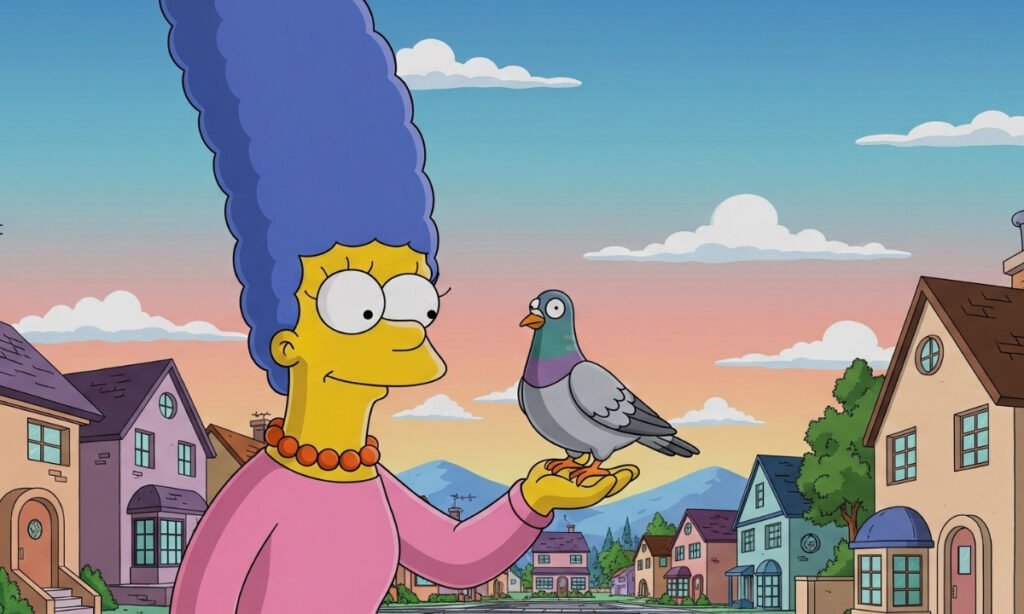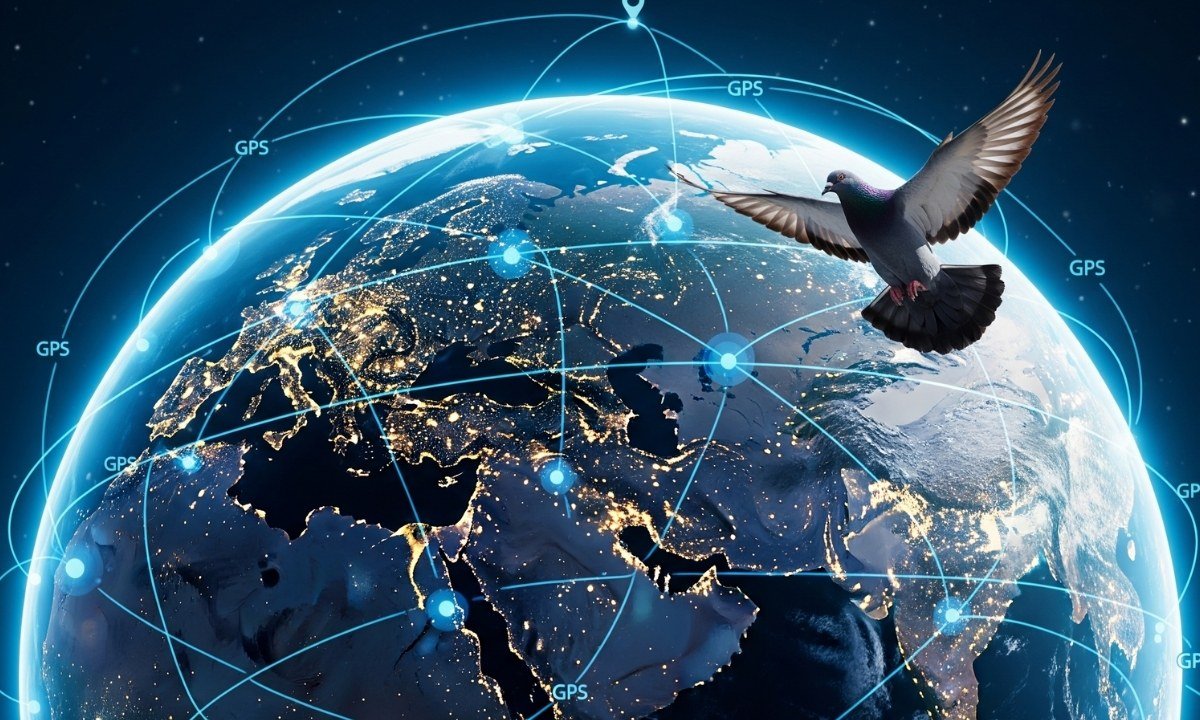The net is once more in a full-fledged tizzy, with keywords whizzing by quicker than an upset bird. Is Marge Simpson really dead?
Has Springfield’s blonde-haired matron finally met her maker? While the rumors of Marge’s demise are, thankfully, highly exaggerated (phew!), the outrage left us wondering about another tragic Simpsons loss. A loss that was real, tragic, and involved one of the world’s most persecuted birds.
This creative, non-canonical flash-forward allows the creators of the program to make an emotional aside acknowledgment of Marge’s position as the center of the future for the family, with a lighthearted divine intervention, without ever removing her from the foreground of, ongoing story.
We must speak about Raymond Bird.
For those who have lost track, Bart once adopted a wounded pigeon and named him Raymond. He trained him to be a messenger, and they really bonded. And then, in a very sad moment, Raymond got eaten by Santa’s Little Helper. It was a tough, funny, and unexpectedly deep examination of love and loss. Though Marge is fine, let’s take a shot out for Raymond and look at the incredible world of the animal that he was named after.
1. More Than ‘Rats with Wings’: The Unexpected Brains of Pigeons
Don’t chase one away from your park bench until you listen to this: the lowly pigeon is a bundle of brains. They’re one of only a few species that have been able to pass the “mirror test,” showing that they’re capable of recognizing themselves.
- Definition: Pigeon intelligence is employed to explain their exceptional cognitive abilities, such as abstract numerical capacity, self-awareness, and sophisticated problem-solving capabilities that rival some primates.
- Key Facts:
– They Know You: Through research, it has been found that pigeons can recognize human faces and will remember whether a person has treated them nicely or attacked them. Be kind!
– Art Critics: In one famous experiment in Japan, pigeons were trained to distinguish between Picasso and Monet. They were able to select the correct style with pinpoint accuracy.
– Medical Assistants: Pigeons have even been trained to identify cancer cells in medical images. They possess such sophisticated pattern-recognition skills that they matched human pathologists in a matter of weeks of training.
- A Different Perspective: The ubiquitous “feral” pigeon that you see in cities is actually the descendants of the domesticated Rock Dove. They are not necessarily city birds; they’re fantastic, adaptable birds that have learned to thrive in the world that we create for them.
2. War Heroes Turned City Survivors: A Pigeon’s Distinguished Resume
Raymond Bird was meant to be a messenger, and that talks of a noble and heroic lineage. Pigeons have been man’s faithful long-distance messengers for millennia.
- Definition: Homing pigeon is a specific type of domestic pigeon that has been selectively bred to find its way home over exceptionally long distances. This trait made them invaluable for communication, especially in war.
- Key Facts:
– WWI Hero: A homing pigeon by the name of Cher Ami saved the lives of nearly 200 American soldiers during World War I. She was shot in her chest and had lost one leg, yet she still managed to deliver her important message. She was given the French “Croix de Guerre” medal for her bravery.
– The Reuters Network: Before electronic communication, the founder of the Reuters news agency, Paul Reuter, had a force of over 45 pigeons to transmit stock prices and news from Belgium to Germany, hours ahead of the train.
– Endurance Athletes: A race pigeon can fly as fast as 90 mph (145 km/h) and cover as far as 600 miles (nearly 1,000 km) in a single day.
- Major Debate: With instant electronic communication, do homing pigeons have any use now? While their application in war and trade has vanished, there is an international sport of racing pigeons and their biological GPS remains a topic of heated scientific interest.
3. The Homing Instinct: Nature’s Unbreakable GPS
How did Bart expect Raymond Bird to find his way back? He was relying upon one of nature’s finest miracles: the homing instinct of a pigeon.
- Definition: Homing instinct is the inborn ability of pigeons to find their way back to their nest from extremely long distances, even from locations they’ve never visited before.
- Key Facts:
– Magnetic Sense: The most prevalent belief is that pigeons have a “sixth sense.” They have particles of iron present in their beaks which are believed to act as a biological compass, allowing them to detect the magnetic fields of the Earth.
– Sun and Odors: They also use the position of the sun as a cue and even use low-frequency sound waves and smell to create “odor maps” of their environment.
– It’s Not Perfect: As great as it is, this ability can be disrupted. Solar flares, which destabilize magnetic fields, have been found to confuse pigeons.
- Ongoing Research: Scientists don’t yet know how all of these senses mesh. The pigeon’s brain is able to process magnetic, solar, and smell information simultaneously, an act of biological computation we are still working to understand.
If you sometimes relate to their charmingly chaotic energy, you can capture that ‘All Panic, No Disco‘ feeling with this retro pigeon tee.

Recommended Resources
- Article: The Surprising Intelligence of Pigeons (Audubon) – A wonderful and readable article on the intellectual abilities of these birds.
- Video: “The Homing Instinct – Pigeons” (PBS Nature) – Such a lovely, short documentary that delves into the science of pigeons’ homing ability.
- Book: “The Pigeon” by Wendell Levi – Informally called the “pigeon bible,” it’s an encyclopedia of all things pigeon for the deeply inquisitive.
Smart Summary
And so, just as the simpsons kill off marge rumor is just cyber gossip, the life of pigeons is really quite interesting. Here’s what to take away:
- Marge is Fine: Marge Simpson’s death has been overstated way beyond report. It’s a continuing internet urban legend, though, but she remains a great aspect of The Simpsons.
- Pigeons are Geniuses: They can solve that they exist in a mirror, remember human faces, and even learned to distinguish artistic movements and detect cancer.
- They Are War Heroes: Homing pigeons like Cher Ami saved hundreds of lives by delivering critical messages during war, gaining them a place in history.
- Nature’s GPS: Pigeons possess a sophisticated mechanism of using the Earth’s magnetic field, sun position, and even sense of smell to find their way.
- Misunderstood, Not Menacing: The urban city pigeon is a very successful descendant of the domesticated Rock Dove and has a long history of association with humans.




